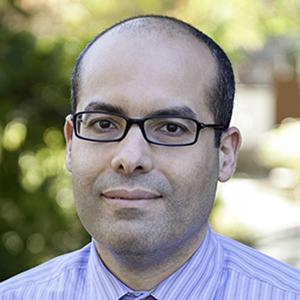A targeted therapy for colorectal cancer and an immunotherapy drug for head and neck cancer are just some of the innovative treatments City of Hope doctors presented at this year’s ASCO20 Virtual Scientific Program, held May 29 through May 31.
The American Society of Clinical Oncology’s annual conference discusses the latest research on cancer treatment, detection and prevention.
City of Hope doctors and scientists presented oral and poster presentations on a wide array of topics.
Targeted therapy against colorectal cancer mutation
Advanced colorectal cancer that progressed on standard chemotherapy has limited treatment options. This is particularly true for KRAS mutated cancers. A novel drug that targets the KRAS G12C mutation may offer hope for metastatic colorectal patients with this mutation, which occurs in about 3-5% of these patients.
AMG 510 is a targeted therapy that is taken orally on a daily basis and can inhibit the growth of KRAS G12C tumors. During this year’s ASCO virtual session, City of Hope’s Marwan Fakih, M.D., professor in the Department of Medical Oncology & Therapeutics Research and medical director of the Judy & Bernard Briskin Center for Clinical Research, for the first time discussed progression-free survival data results for colorectal cancer patients who took AMG 510 in a first in-human, multicenter phase 1 clinical trial.
The trial enrolled 42 patients with advanced colorectal cancer and included four cohorts of patients who were assigned different doses of AMG 510.
At all dose levels, patients had median progression-free survival (PFS) of four months, with the majority reporting few serious side effects; side effects that occurred included diarrhea, nausea and anemia. In addition, patients had a median overall survival rate of 10 months.
At all dose levels, 7% of patient had significant tumor shrinkage (partial response) and 69% had stable disease, resulting in a 76% disease control rate in the overall population. At the highest dose level of 960mg/day, which is the recommended phase 2 dose level, 12% of patients had an objective response and 80% experienced disease control. The median PFS at the 960 mg/day dose level was 4.2 months.
“The bottom line is that these data are meaningful for colorectal cancer patients with KRAS G12C mutation,” Fakih said. “AMG 510 appears to be more favorable in controlling metastatic colorectal cancer — and with few serious side effects — than current Food and Drug Administration-approved therapeutic agents that are used in third and fourth line treatment of this cancer.”
Pioneering geriatric oncology study
Geriatric oncology is a burgeoning field in cancer that focuses on treating older adults — who account for 60% of new cancer diagnoses — with innovative interventions geared toward them. One of those interventions is a geriatric assessment tool for older adults with cancer.
Developed by the late Arti Hurria, M.D., founding director of City of Hope's Center for Cancer and Aging, the assessment tool captures multiple domains including but not limited to functional status, comorbidity and cognition to determine the functional age of older adults, thereby enabling a more tailored approach to cancer care.
A City of Hope-led randomized clinical trial is one of the first to now demonstrate that geriatric assessment-driven interventions can reduce chemotherapy side effects. The results were presented as part of ASCO20’s virtual program.
Six hundred City of Hope patients 65 and older with solid tumors were enrolled in the trial. Two-thirds of the patients were enrolled in geriatric assessment-driven intervention (GAIN) and a third were enrolled in a standard of care approach in which only an oncologist guides the patient’s treatment.
“Geriatric assessment focuses on capturing the whole person, such as how much physical activity the patient can perform, what serious medical conditions he or she might have, a patient's psychological status and other factors,” said Daneng Li, M.D., the trial’s principal investigator and an assistant clinical professor in City of Hope's Department of Medical Oncology & Therapeutics Research "What the assessment does is it really helps a patient’s medical team understand the true nature of the patient that you're treating rather than just one area of the patient. You're getting a much richer picture of who this person is, how treatment can potentially impact them and approaches the medical team can take to reduce any negative impact."
The patients were followed until their chemotherapy ended, or for six months of chemo treatment, whichever came first. Researchers then measured how many serious chemotherapy-related toxicities, such as nausea and fatigue, each group developed.
“The patients that were treated in the ‘GAIN’ arm had a reduction of 10% in significant chemotherapy-related toxicity, compared to the standard of care arm,” Li said. “The reason why this likely occurred is because the GAIN arm was composed of a multidisciplinary team of an oncologist, nurse practitioner, social worker, physical/occupational therapist, nutritionist and pharmacist, who worked together to offer interventions such as physical therapy, social support, nutrition recommendations, and to review medication interactions to address potential areas of vulnerability detected on the geriatric assessment in older adults with cancer.”
“This is one of the first studies to show that if you intervene based on a patient’s geriatric assessment and provide them with the appropriate interventions, you can actually decrease someone's toxicity from chemotherapy in an older adult population,” he added.
Improved testing strategy for TP53 mutation
The inherited TP53 mutation significantly increases a person's risk of developing cancer. Women with the rare mutation have a 50% chance of developing cancer by the age of 30 and a 90% chance over their lifetime; males with the syndrome have a 70% chance of developing cancer over their lifetime. The mutation can cause Li-Fraumeni syndrome, which can lead to the development of sarcomas, brain and breast tumors and adrenocortical cancers.
But there is another group of patients who have a TP 53 mutation, and it is not inherited. These are patients who develop TP53 gene mutations in rapidly growing blood cells as they age, or with exposure to chemotherapy. Knowing the difference is important, as care for each group is very different, since those with the inherited mutation require more extensive cancer screenings and checkups.
Identifying which type of mutation a person has is a difficult task. Led by City of Hope’s Jeffrey Weitzel, M.D., City of Hope presented new research at ASCO's virtual session on how the medical community can better discern whether a person's TP53 mutation is inherited or acquired.
“It’s a clinical conundrum because we have this challenge — you have a result that a clinician might normally interrupt as a mutation that the patient inherited and a clinician might think, ‘It’s Li-Fraumeni syndrome,’” said Weitzel, director of City of Hope’s Division of Clinical Cancer Genomics and the Dr. Norman & Melinda Payson Professor in Medical Oncology. “But we know that a good portion of these are not the real McCoy.”
Among 113 cases with commercially detected TP53 who are enrolled in the Clinical Cancer Genomics Community Research Network registry led by City of Hope and other institutions, Weitzel and his team identified 42 cases where there was adequate clinical history, tissue and biospecimens.
Using a multi-tissue strategy, they were able to discern that 12 of the patients had developed TP53 in aging blood cells, and thus were presumably not at risk for TP 53-related tumors.
“Our testing strategy helps us identify who has the inherited TP53 mutation and who doesn’t, which is critical in helping clinicians determine the best treatment plan for each type of patient," Weitzel said.
Integrated supportive care model reduces hospital stays
Living with cancer can be a difficult journey, but City of Hope’s Department of Supportive Care Medicine is a unique care model that provides its patients with invaluable resources and support to ease the challenges. Its integrated supportive care model puts patients in touch with experts in the field of palliative care, psychiatry, psychology, interventional pain, social work, child life, distress screening and couples counseling to help patients and their families cope with a cancer diagnosis. This helps patients spend as much quality time away from the hospital as possible.
“City of Hope has a special program, one that brings together under one umbrella a wide range of services working closely together as a unit, rather than as isolated parts,” said William Dale, M.D., Ph.D., the Arthur M. Coppola Family Chair in Supportive Care Medicine at City of Hope and a health policy expert. “In this way, we wrap our patients with a comprehensive care plan. But more data is needed about this way of caring for patients, which is why our team collected this.”
“While we know that individual supportive care services can improve patient-reported outcomes and quality of life, few studies exist that evaluate the full impact of an integrated supportive care model like we have here at City of Hope” said Jessica Kaltman, M.D., M.S.H.P.M., assistant clinical professor in the Division of Supportive Medicine within the Department of Supportive Care Medicine.
Kaltman, Dale and other members of the research team collected data on 1,627 patients (809 with hematologic malignancies, 818 with solid tumors) who were hospitalized at City of Hope and then tracked if they were part of the integrated supportive care model either prior to hospitalization or after admission. They then compared the two groups to see if earlier supportive care, before a hospitalization occurred, influenced lengths of stay, ICU stays or hospital costs.
For both hematology and medical oncology patients, they found that participation in this care model earlier, prior to hospitalization, resulted in decreased length of stay and decreased chance of ICU admission when compared to patients whose first contact with supportive care was only after the initial admission. Additionally, earlier contact with the integrated supportive care model led to decreased inpatient costs compared with those seen only after the first admission.
Potential new treatment for head and neck cancer
Current standard of care for advanced head and neck squamous cell carcinoma is to use the anti-PD1 checkpoint inhibitor, pembrolizumab, with chemotherapy (platinum/5-fluorouracil) or without it. A clinical trial led by
Erminia Massarelli, M.D., Ph.D., M.S., associate clinical professor in City of Hope’s Department of Medical Oncology & Therapeutics Research, has added an immunotherapy drug to that standard of care. Massarelli presented the trial’s safety results during ASCO20’s virtual program.
The immunotherapy is GSK3359609 (GSK609), which binds the inducible T cell co-stimulatory receptor
(ICOS) molecule that is expressed on activated T cells.
“It’s a different mechanism than checkpoint inhibitors,” Massarelli explained. “The ICOS molecule is a receptor on the activated T cell. The binding of this receptor increases the activation on the T cell and therefore the immune response against cancer.”
By using GSK609 with an anti-PD1 checkpoint inhibitor such as pembrolizumab, a T cell is activated with two different mechanisms of action — ICOS, a direct activation, and pembrolizumab — an indirect activation of the T cell.
INDUCE-1 is a multi-cohort phase 1 clinical trial with two cohorts and 29 patients enrolled. The first group (10 patients) received GSK609 and chemotherapy (platinum and 5-fluorouracil), and another group (19 patients) received the immunotherapy, chemo (also platinum and 5-fluorouracil) and pembrolizumab.
“We found that these three and four drug regimens together are safe, and the addition of GSK609 doesn’t increase side effects, or cause any serious ones,” Massarelli said.
Most side effects were mild and consistent with pembrolizumab and chemotherapy toxicities.
Massarelli and her team now plan to open a phase 2/3 trial that will compare the use of the four drug regimen as a first-line therapy for patients with low PDL1 to standard of care treatment.





